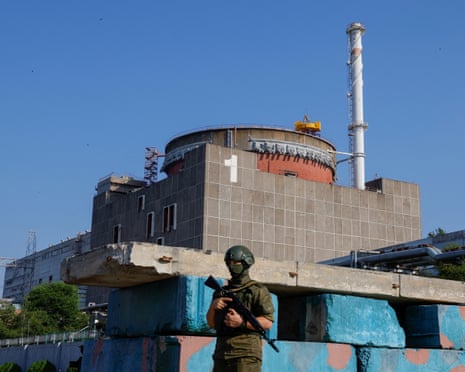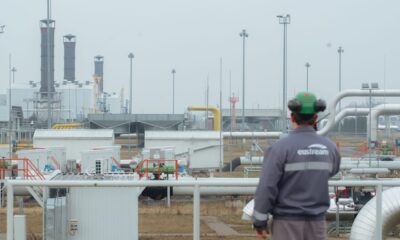World
Zaporizhzhia Nuclear Plant Restores Power After Month-Long Crisis

The Zaporizhzhia Nuclear Power Plant has been successfully reconnected to external electrical power from Ukraine, resolving a month-long emergency that threatened the safety of the facility. This reconnection follows a series of events that saw the plant, Europe’s largest nuclear site, relying on backup generators since its last external power line was severed on September 23, 2023.
Russian engineers managed to restore power to the plant after a failed attempt to connect it to the Russian grid on October 7. Ukrainian sources indicated that this earlier connection effort was thwarted by partisan attacks targeting substations in the occupied Zaporizhzhia region, damaging a new high-voltage line intended to link the plant to the Russian grid through Mariupol. As a result, Russian authorities opted to repair a 750-kilovolt line that runs across the Dnipro River into Ukrainian-held territory.
In a statement, Yevgeny Balitsky, the Russian-appointed governor of the occupied Zaporizhzhia region, reported power cuts across all settlements in the area following what he described as a terrorist drone attack. This situation unfolded after the plant had been operating on backup diesel generators for an extended period, far exceeding the standard three-day safety limit. Though the six reactors are currently in cold shutdown, without adequate cooling, there were fears they could overheat, raising alarms about a potential nuclear disaster similar to Fukushima.
The Russian administration at the plant confirmed the restoration of power, stating that it had occurred following a temporary ceasefire brokered by the International Atomic Energy Agency (IAEA). Shortly thereafter, Rafael Grossi, the IAEA’s director-general, acknowledged the reconnection and noted that it marked a positive development for nuclear safety, albeit within a precarious overall context.
Concerns linger over Russia’s motivations, with Ukrainian officials and independent experts accusing the Kremlin of deliberately damaging the high-voltage line last month to create a crisis that would necessitate reconnecting the facility to the Russian grid. The Zaporizhzhia plant, captured by Russian forces in March 2022, has since remained a focal point of international scrutiny. Its reactors were gradually shut down for safety reasons, yet Russia has expressed intentions to restart at least some of the reactors.
In a technical document submitted to the IAEA on June 3, Russia indicated that it had prepared a procedure for voltage transmission from its unified power system in the event of disconnection from Ukraine. Moreover, Alexey Likhachev, the director-general of Rosatom, stated in September that the company was ready to resume electricity generation, potentially for both Russian territories and Ukraine, should conditions permit.
The Zaporizhzhia power plant has been a topic of international negotiations, including discussions involving former U.S. President Donald Trump and Vladimir Putin, though the Kremlin insists that the facility is now Russian territory. As the situation continues to evolve, the implications for regional energy security and nuclear safety remain critical.
-

 Entertainment2 months ago
Entertainment2 months agoAnn Ming Reflects on ITV’s ‘I Fought the Law’ Drama
-

 Entertainment3 months ago
Entertainment3 months agoKate Garraway Sells £2 Million Home Amid Financial Struggles
-

 Health2 months ago
Health2 months agoKatie Price Faces New Health Concerns After Cancer Symptoms Resurface
-

 Entertainment2 months ago
Entertainment2 months agoCoronation Street’s Carl Webster Faces Trouble with New Affairs
-

 Entertainment2 months ago
Entertainment2 months agoWhere is Tinder Swindler Simon Leviev? Latest Updates Revealed
-

 Entertainment3 months ago
Entertainment3 months agoKim Cattrall Posts Cryptic Message After HBO’s Sequel Cancellation
-

 Entertainment2 months ago
Entertainment2 months agoOlivia Attwood Opens Up About Fallout with Former Best Friend
-

 Entertainment2 months ago
Entertainment2 months agoMasterChef Faces Turmoil as Tom Kerridge Withdraws from Hosting Role
-

 Entertainment3 months ago
Entertainment3 months agoSpeculation Surrounds Home and Away as Cast Departures Mount
-

 World2 months ago
World2 months agoCole Palmer’s Mysterious Message to Kobbie Mainoo Sparks Speculation
-

 Entertainment3 months ago
Entertainment3 months agoMarkiplier Addresses AI Controversy During Livestream Response
-

 Entertainment2 months ago
Entertainment2 months agoITV’s I Fought the Law: Unraveling the True Story Behind the Drama





















